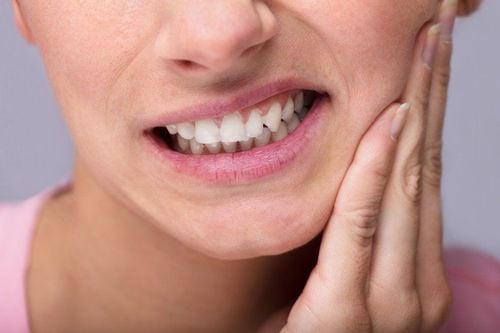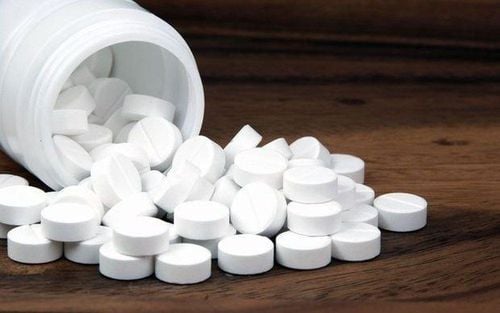This is an automatically translated article.
Children need to eat healthy to help prevent tooth decay and other dental problems. Good nutrition includes all the food groups and healthy choices for good oral health. The article will help you better understand the role of nutrition in the development of children's teeth.1. The role of nutrition in the development of children's teeth
Nutrition for healthy teeth in children is essential that parents should take care of from a young age by giving them a healthy diet. Nutrition for healthy teeth in children includes consuming a nutritionally balanced diet, high in antioxidants and limiting decay-prone foods (those high in sugars, carbohydrates, and starches). flour ).What a child eats can directly affect a child's oral health and plays an important role in preventive dentistry. In addition to daily brushing and flossing, children should have healthy eating habits, which will not only promote their overall health, but also protect their teeth and gums from decay. and dental disease, resulting in a healthy, beautiful smile.
To have the right nutrition for healthy teeth in children, parents should use some foods that are good for their teeth, which work to increase the strength of their teeth and protect their teeth from decay. and at the same time clean teeth naturally. Other foods tend to stick to teeth, creating food for bacteria naturally present in the mouth to attack teeth and cause tooth decay. Foods for good oral health include:
Fruits and vegetables: Crunchy fruits and vegetables (like celery, carrots and apples) help stimulate gums and clean teeth by removing bacteria during chewing. They also promote saliva production to wash away food particles and bacteria from the teeth. The high water content in many fruits and vegetables provides additional cleansing benefits. In addition, raw fruits and vegetables have a high water content, as well as fiber and other nutrients. Parents can choose fruits such as cucumber, celery, apple, pear, etc. Nutrition for healthy teeth in children includes leafy vegetables, green vegetables, such as vegetables. spinach and kale, are high in calcium, which strengthens tooth enamel, and other vitamins and minerals that promote oral health. Calcium-rich foods: Calcium-rich foods like cheese, low-fat milk and yogurt are also good foods for teeth. Like broccoli, they contain high levels of calcium that strengthens tooth enamel. Cheese raises the pH levels in the mouth, reducing the risk of tooth decay. Cheeses such as Swiss cheese, cheddar cheese and Monterey jack, ... if chewed for a long time also increase saliva production to help clean teeth. Yogurt contains protein that strengthens teeth and beneficial bacteria (probiotics), which benefit teeth and gums by helping to eliminate bacteria that cause tooth decay. Protein: Lean meats like turkey, chicken and white fish, and low-sugar nuts, avocados, and peanuts are great sources of protein that help strengthen tooth enamel. Almonds are also considered a great choice because they are low in sugar and contain both calcium and protein. Sugar-free gum: This may come as a surprise, but the truth is that chewing sugar-free gum can actually be beneficial for oral health. The act of chewing increases salivation and helps dislodge food particles that can get between teeth. Sugar-free gum sweetened with Xylitol also helps reduce bacteria in the mouth. Just make sure your child chews gum in moderation, and only give it to him when he's old enough not to swallow it.
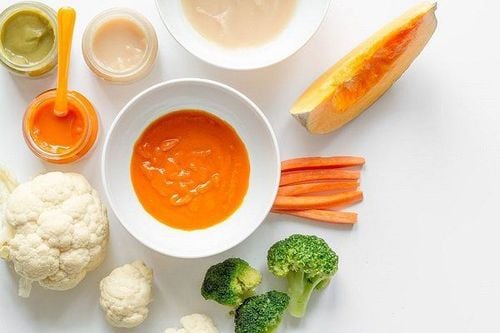
Trẻ em cần cung cấp đầy đủ dinh dưỡng cho răng phát triển toàn diện
In addition to certain foods that help protect teeth, there are also certain foods that create an environment in which bacteria in the mouth can thrive. Limit your child's intake of certain beverages and foods with colorings, sweeteners, etc. to reduce the risk of tooth decay, tooth decay in children and gum disease. Foods and drinks to limit include:
Sugary drinks: Sodas, juices and other sugary drinks should be limited, as sugar can stay on teeth and promote hole formation. Caries. Regular milk and chocolate milk also contain sugar, so children should drink it in moderation. Parents should help children form good oral habits by drinking water regularly. Snacks high in sugar, starches, and carbohydrates: When chips, cookies, and sweet snacks like cookies, cakes, and candies remain on teeth for a long time, tooth decay can begin. Frequent snacking is more harmful to children. Some studies have shown that the more time allowed between meals, the easier it is for saliva to clean teeth. Therefore, parents should encourage children to brush their teeth after snacking, if possible. Use sticky or chewy foods: Candy like marshmallows, caramels, and lollipops can stick to teeth long after they've been consumed. Sticky foods, like granola bars and raisins, are also hard to wash away with saliva. Honey, molasses and syrup when used can coat teeth, allowing sugar to feed bacteria and promote plaque growth. Parents should note that when giving sweets to children, try to incorporate them after meals when saliva has increased. For children, choosing food also becomes difficult for them. Therefore, if children often refuse to eat according to the diet that adults give. However, parents should not be discouraged and continue to feed their children by dividing them into small portions, trying different textures and temperatures.
For example, some children like raw vegetables but do not like cooked vegetables and vice versa. Chopped vegetables may be easier to chew than whole-grain vegetables. Partially cooked carrots may be easier to eat than raw. Children may also prefer fresh vegetables to frozen ones. Try different methods until the parent discovers what the child likes. Providing children with a balanced, nutritious diet, along with teaching proper brushing and flossing techniques and scheduling regular dental visits, promotes healthy habits that can benefits for children's oral health throughout life.
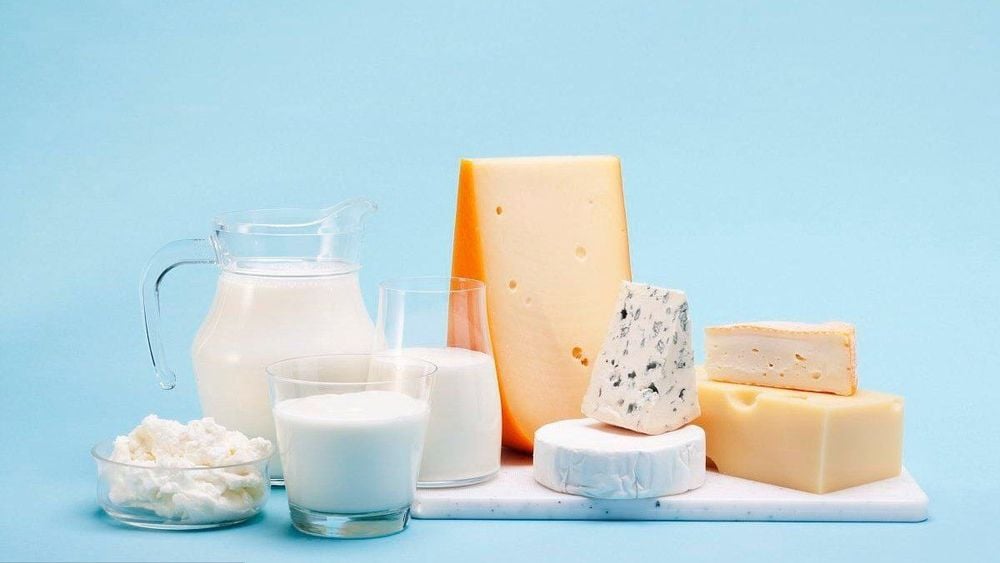
Sữa, sữa chua, phomai là một số thực phẩm tốt cho răng
2. What is the link between nutrition and children's oral health?
Experts agree that children need foods from all the major food groups to grow properly and stay healthy. However, if your child consumes too many carbohydrates, sugars (e.g. from cakes, cookies, candy, milk, fruit juices and other sugary foods and drinks), salty and starchy foods (e.g. crackers and chips) are more likely to cause tooth decay. Carbohydrates that stay on the teeth for a long time are the main culprits that lead to tooth decay. Here are some tips for choosing foods that are better for your child's teeth:Store fruits and vegetables at home to provide as a "healthy snack" instead of carbohydrates. Choose fruits and vegetables that contain a lot of water, such as pears, melons, celery, and cucumbers. Limit bananas and raisins as they contain concentrated sugars. Serve cheese with lunch or treat it as a snack. Cheese - especially cheddar, Monterey Jack, Swiss and other aged cheeses will help trigger the flow of saliva, which helps wash away food particles from your child's teeth. Avoid sticky, chewy foods: Foods like raisins, dried figs, granola bars, oatmeal or peanut butter cookies, jelly beans, caramel, honey, molasses, and syrups stick to your teeth, causing them to stick to your teeth. Saliva is difficult to wash off. Let your child brush his teeth immediately after eating these foods. Eat sugary treats with meals, not as snacks: If you're going to give your child any sweets, offer them as dessert right after the meal. There is usually an increased amount of saliva in the mouth around meals, making it easier to wash food off the teeth. Drinks with meals also help wash away food particles on the teeth. Get your kids into the habit of eating as little junk food as possible: The frequency of snacking is much more important than the amount consumed. The time between meals allows saliva to wash away food particles that bacteria will feed on. Frequent snacking without brushing immediately afterwards provides constant fuel to feed bacteria, which leads to plaque development and tooth decay. Parents should try to limit snacking as much as possible and to no more than one or two meals a day. Brush your teeth immediately after eating snacks, if possible. Limit sugary foods on teeth: When children eat lollipops, hard candies, cough drops and mints, it can cause tooth decay because they constantly coat the teeth with sugar. Children should limit eating and brush their teeth after eating. Buy low-sugar or sugar-free foods. Never let a child go to bed with a bottle of milk, juice, or soda. If your baby needs a bottle before bedtime, fill the bottle with plain water. Offer your child water instead of juice or soft drinks. Juices, soft drinks, and even milk all contain sugar. Water is not harmful to teeth and aids in washing away food particles that can stick to teeth.
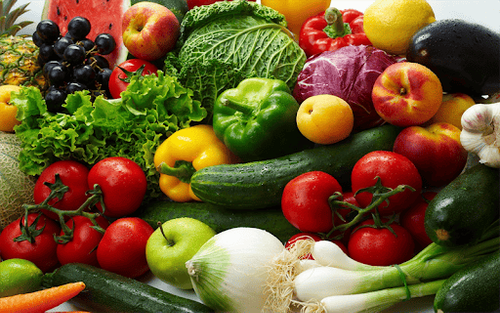
Trái cây và rau cũng là các thực phẩm tốt cho răng
Choose sugar-free or xylitol-sweetened gum: If your child likes to chew gum, Xylitol helps reduce the amount of bacteria in the mouth and chewing helps increase saliva flow. About brushing and dentist visits: Give your child fluoride, brushing and flossing. The best way to prevent tooth decay is to use a fluoride toothpaste every day after the age of 2 or once a child can spit and not swallow the toothpaste. Fluoride reverses premature decay. As teeth are formed, fluoride restructures the surface. This means it will help return minerals to the teeth. Minerals help keep teeth strong, which, in turn, helps prevent tooth decay. Get your kids into the habit of brushing their teeth at least twice a day and after each meal or snack. If you can't brush your teeth between meals, at least rinse your mouth with water several times. Floss your child at least once daily to help remove debris between teeth and below the gum line. Make sure to brush your child's teeth after giving the medicine. Medicines like cough syrups contain sugar that bacteria in the mouth use to make acids. These acids can erode tooth enamel, the top protective layer of teeth. Parents should send their children to the dentist regularly. Children should see the dentist for the first time when they are 1 year old or within 6 months of the first tooth entering the gum. Regular dental checkups will also help detect any developing dental problems early.
Protecting children's teeth is something that parents should pay attention to from a young age. By many measures such as changing the diet to a healthy one, minimizing the use of foods containing sugar and limiting eating foods that are not good for teeth. Parents should let children brush their teeth after sweet meals, eating snacks, ... to ensure the removal of plaque in their children's teeth, keeping children with good teeth for the future.
To examine and treat dental problems, you can go to the Department of Odonto-Stomatology - Vinmec International General Hospital. Vinmec is a high-quality medical facility in Vietnam with a team of highly qualified medical professionals, well-trained, domestic and foreign, and experienced.
A system of modern and advanced medical equipment, possessing many of the best machines in the world, helping to detect many difficult and dangerous diseases in a short time, supporting the diagnosis and treatment of doctors the most effective. Hospital space designed according to 5-star hotel standards will bring patients comfort, friendliness and peace of mind.
Please dial HOTLINE for more information or register for an appointment HERE. Download MyVinmec app to make appointments faster and to manage your bookings easily.
Reference articles: bvndtp.org.vn, suckhoedoisong.vn



